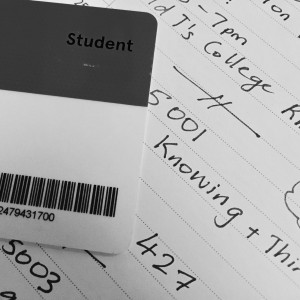This year, I’m on sabbatical. I feel fortunate to be immersed in postgraduate study. My main job is now “student”. Not teacher, coordinator or administrator – but wide-eyed, optimistic learner. Hoorah! I even have new pens!
Even before the first lecture, I’ve learned a wonderful lesson…
Students are people, not barcodes.
After a few weeks of anonymous interactions, using only a 9-digit identification number, I began to wonder if I’d missed The Singularity! Was my institution completely automated? Was there a hyper-efficient robot at the helm? If so, did it have a name – like Siri or Cortana – and could we be friends?
I felt some loss of identity. From the intimacy of small school leadership, it was my turn to be a number in a database.
Under my numerical pseudonym, I sought to untangle schedules & technical issues – without success.
And then, everything changed. Enter Gavin – a real, live human who responded to an email. He updated a database, fixed a glitch, and signed off with, “Jolly good – enjoy your study, Shannon.”
With one kind sentence, my experience changed. His personal comment invoked a sense of belonging – which grew into engagement and ultimately, motivation to learn. My brain was ready to study – thanks to Gavin.
In the shoes of a student, it was the humanity of the institution that created the perfect condition for learning. As faculty welcomes, social gatherings and information sessions unfold, I’m very grateful. Connections multiply and belonging deepens.
Of course, streamlined systems are important, especially for routine tasks on a large-scale. Online tools for enrolment and scheduling allow human and financial resources to be channeled into education, rather than administration. Tech allows learning to occur anywhere, anytime, with anyone – thereby removing many traditional barriers.
But – in our quest for efficiency, let us never overlook the power of human connection with the learner.
Brains, of any age, cannot learn in the absence of relationships.
Ever watched a primary school teacher herd a gaggle of children into a classroom?
All that hustle & bustle, touching, talking & exclaiming over new haircuts and sticks found in the playground sends a crucial message – that children are noticed, known, and important in this space. It creates a culture of connectedness, which is a prerequisite for higher cognition.
I am very grateful for connections with mentors and peers at my new home of learning.
So whatever you’re teaching today – early literacy or research methodology – enjoy connecting with a student. It will fuel their learning, And enhance your teaching.
In a culture of connection, everyone learns more.
All credit to Sydney Uni‘s program support officers and extensive, inclusive orientation.
Gavin is not his name. He deserves privacy. And my most sincere thanks!
One Comment
Join the conversation and post a comment.




Start with the child…